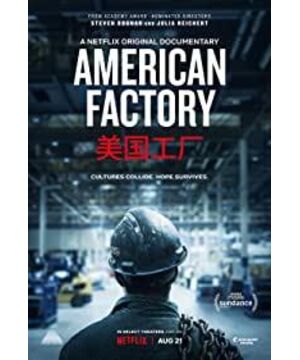In 2019, many people in the circle of friends recommended this documentary. At that time, I was too tired to watch it, but today I finally finished watching it during lunch time. First of all, this is a very good documentary with a five-star recommendation. I have taken a documentary-related course as an undergraduate as an elective. I remember very clearly that the teacher said that documentaries generally do not participate in interference, and the creators are just bystanders. But now many documentaries are mixed with emotional orientation. Personally, I prefer this kind of out-of-the-box film without any embellishments.
Secondly, after reading it, I have a lot of reflections on culture, system, etc., of course, I also have many questions. This documentary is labeled as a classic case of cultural conflict, but I wonder if just one cultural conflict can explain this complex phenomenon. The first half is a background introduction, the original general factory closed, and a large number of workers lost their jobs. This starts to involve trade unions. If you only see this, you will question why there is such an organization as trade unions? Unions can organize strikes at any time to protect workers' interests, such as raising hourly wages, but it undoubtedly increases costs significantly for companies. When the cost is too high for the company to bear, bankruptcy is a natural thing. As bystanders we would think it is better to cut costs appropriately than to go bankrupt. Bankruptcy means that everyone is unemployed, and the amount of subsidies received is limited, so what is the future? Although trade unions protect the interests of workers, it is also because of this layer of protection that production efficiency is extremely low. It is a common phenomenon for workers to chat during working hours. Did this also accelerate the closure of the GM factory? The second half is the focus of the film, and we can see the entire development process of the contradiction between the two sides. Of course, the center of the conflict is not to join a union. Mr. Cao was definitely against it, but some workers started to strike. Seeing this, I am still thinking that you have finally re-employed and gained income, why do you have to toss and make yourself unemployed in the end? It wasn't until I looked at the domestic workers who came for technical assistance that I started to rethink the issue. American workers work 40 hours a week, and domestic workers take about two days off a month. There is no room for discussion about wages here, even if you don’t say it. But should wages be low just because we are a developing country? Obviously, this group of domestic workers has better technology and higher work efficiency. This reminds me of what I said before about 996 as a blessing. Of course, everyone criticizes this statement, but it is only an online attack. Has the reality changed? Are there big companies taking the lead in complying with labor laws? Or has someone fought for their own rights and interests by relying on labor laws? What everyone opposes or criticizes is not overtime, but unpaid overtime. However, if you work overtime with pay, new problems will arise. For example, work within the original working hours is delayed into overtime hours, and the workload during normal working hours is difficult to quantify. Even if it can be quantified and highly subjective, too high an indicator is still equivalent to unpaid overtime. Then who will protect the rights and interests of our group of social animals? I once chatted with a friend about this issue. I said that our work is quite undignified, and she replied that we have not been lifted out of poverty. What kind of dignity are we talking about. But I was thinking about poverty = no dignity? If poverty is only measured by money, middle- and high-income people sometimes have no dignity, just like the news that has been slapped on recently. Perhaps there are braver people who resist this injustice by resigning. How many splashes can be caused? There are always more people on your behalf. Especially those big companies that make good news in 996. So I was very confused when I watched this documentary.
View more about American Factory reviews








